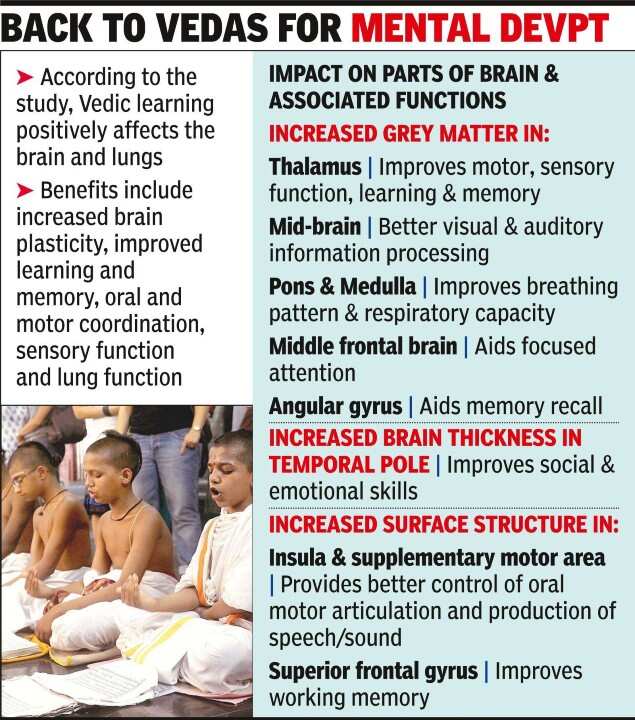- News
- City News
- lucknow News
- Vedic learning helps brain development, boosts functioning of lungs: Study
Vedic learning helps brain development, boosts functioning of lungs: Study

According to the study, Vedic learning positively affects the brain and lungs.
LUCKNOW: Vedic education, which involves reciting and memorising Vedic hymns and mantras in Sanskrit, in certain ways aids brain development, according to a study undertaken by researchers at the Centre of Biomedical Research (CBMR), Lucknow.
Published in the recent issue of ‘Scientific Report’ (a journal of the ‘Nature’ series), the study noted that Vedic learning led to improved sensory function, better brain plasticity, learning and memory skills, besides improving respiratory function.

“The powers of Vedic education lies in the techniques used to enable a scholar recite and memorise Vedic text in a certain characteristic way (in which words and syllables are not altered). To master the language and text, the scholar needs extraordinary memory, powerful control on breathing and proper alignment of motor articulation. When the elements fall in sync over the years, the magic is created. In the process, the scholar’s brain develops in unusual ways besides strengthening lungs,” explained Uttam Kumar, the principal author who led the study.
The researchers, also including Anshita Singh and Prakash Padakannya from Christ University, Bengaluru, pointed out that in the long-term Vedic course, the commonly used methods include Vedic recitation through techniques like Pada Paath (in which the sentence is broken down into words instead of stringing them together), Krama Paath (which involves pairing the words successively and sequentially such as the first word to the second, and so on) and Jata Paatha (first and second words are first recited together and then recited in reverse order and then again in original order).
Brain plasticity or neuroplasticity is the key to brain development. According to scientific journal, Neural Plasticity, brain plasticity is the ability of the neural networks in the brain to change through growth, re-organisation, practice and experience.
Structural plasticity is the ability to eliminate redundant pathways and build new ones among neurons through learning. This characteristic is often associated with individual’s ability to adapt to changes and even overcome diseases and problems.
The assessments also indicated that trained Vedic scholars have better immediate recall memory skills and more grey and white matter in multiple brain regions.
Grey matter is vital for processing information in the brain while white matter is essential for making effective connection with multiple brain regions.
The study also identified changes in surface morphology and cortical thickness in crucial brain regions. These changes in multiple regions of the brain clearly indicate the gross structural plasticity changes that is directly linked to Vedic learning.
Researchers studied brain activity of 25 Vedic scholars with the Brain Analysis Technique magnetic resonance imaging (MRI) and compared them with the same number of non-Vedic scholars who could read Sanskrit.
In the assessment, structure of the brain and their function were observed. Three inter-related but distinct computational analysis techniques were used to understand brain plasticity phenomena such as brain’s grey and white matter measurement, brain thickness measurement and assessing changes in brain surface morphology.
Director, CBMR, Prof Alok Dhawan said: “The study establishes the edge of structured learning which is being challenged by many societies. However, the work has proven that Vedic learning pedagogy impacts brain and lung health against systems and methods which exert stress on children. With Sanskrit being in demand in the world of computers, it may not be a bad idea for parents to encourage their children to learn it.”
Faculty at Central Sanskrit University, Lucknow, Prof Madan Mohan Pathak said, “We believe that Vedas are the starting point of all knowledge running this world. But there is no dearth of people who question the power of Vedic learning. The work offers a befitting reply to such ignorant minds. Vedic hymns were recited by gods for the benefit of human race.”
Published in the recent issue of ‘Scientific Report’ (a journal of the ‘Nature’ series), the study noted that Vedic learning led to improved sensory function, better brain plasticity, learning and memory skills, besides improving respiratory function.

“The powers of Vedic education lies in the techniques used to enable a scholar recite and memorise Vedic text in a certain characteristic way (in which words and syllables are not altered). To master the language and text, the scholar needs extraordinary memory, powerful control on breathing and proper alignment of motor articulation. When the elements fall in sync over the years, the magic is created. In the process, the scholar’s brain develops in unusual ways besides strengthening lungs,” explained Uttam Kumar, the principal author who led the study.
The researchers, also including Anshita Singh and Prakash Padakannya from Christ University, Bengaluru, pointed out that in the long-term Vedic course, the commonly used methods include Vedic recitation through techniques like Pada Paath (in which the sentence is broken down into words instead of stringing them together), Krama Paath (which involves pairing the words successively and sequentially such as the first word to the second, and so on) and Jata Paatha (first and second words are first recited together and then recited in reverse order and then again in original order).
Brain plasticity or neuroplasticity is the key to brain development. According to scientific journal, Neural Plasticity, brain plasticity is the ability of the neural networks in the brain to change through growth, re-organisation, practice and experience.
Structural plasticity is the ability to eliminate redundant pathways and build new ones among neurons through learning. This characteristic is often associated with individual’s ability to adapt to changes and even overcome diseases and problems.
The assessments also indicated that trained Vedic scholars have better immediate recall memory skills and more grey and white matter in multiple brain regions.
Grey matter is vital for processing information in the brain while white matter is essential for making effective connection with multiple brain regions.
The study also identified changes in surface morphology and cortical thickness in crucial brain regions. These changes in multiple regions of the brain clearly indicate the gross structural plasticity changes that is directly linked to Vedic learning.
Researchers studied brain activity of 25 Vedic scholars with the Brain Analysis Technique magnetic resonance imaging (MRI) and compared them with the same number of non-Vedic scholars who could read Sanskrit.
In the assessment, structure of the brain and their function were observed. Three inter-related but distinct computational analysis techniques were used to understand brain plasticity phenomena such as brain’s grey and white matter measurement, brain thickness measurement and assessing changes in brain surface morphology.
Director, CBMR, Prof Alok Dhawan said: “The study establishes the edge of structured learning which is being challenged by many societies. However, the work has proven that Vedic learning pedagogy impacts brain and lung health against systems and methods which exert stress on children. With Sanskrit being in demand in the world of computers, it may not be a bad idea for parents to encourage their children to learn it.”
Faculty at Central Sanskrit University, Lucknow, Prof Madan Mohan Pathak said, “We believe that Vedas are the starting point of all knowledge running this world. But there is no dearth of people who question the power of Vedic learning. The work offers a befitting reply to such ignorant minds. Vedic hymns were recited by gods for the benefit of human race.”
FacebookTwitterLinkedinEMail
Start a Conversation
end of article
Quick Links
Delhi Air PollutionDelhi TemperatureChennai WeatherBangalore TemperatureCovid vaccination centres in DelhiCoronavirus in DelhiRTPCR test in GurgaonHyderabad RainPollution level in BangaloreDelhi SmogDelhi TemperatureNoida AQIGurgaon AQI todayFire in MumbaiMumbai RainsCovid 19 RT PCR Test in NoidaDelhi AQI todaySrinagar encounter
